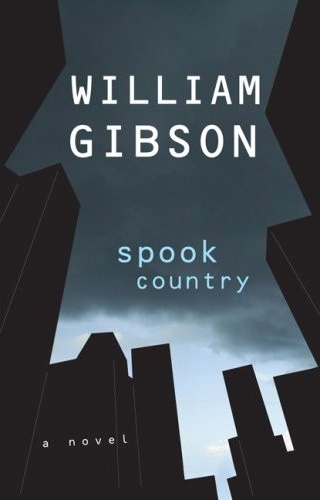
Sunday, September 23, 2007
The Launch Of Spook Country By William Gibson
 Given the depths to which sci-fi fans take their fandom I was quite surprised by the less than heaving turn out to the Toronto launch of William Gibson's new work Spook Country at the regular This Is Not a Reading Series! hosted by Eye Weekly, one of the free cultural weeklies you find scattered all over the subway. It's the sort of paper you pick up about five different copies of every edition, dumping them once done an article and fully confident one will be awaiting you at your cubicle once you hit work the next day.
Given the depths to which sci-fi fans take their fandom I was quite surprised by the less than heaving turn out to the Toronto launch of William Gibson's new work Spook Country at the regular This Is Not a Reading Series! hosted by Eye Weekly, one of the free cultural weeklies you find scattered all over the subway. It's the sort of paper you pick up about five different copies of every edition, dumping them once done an article and fully confident one will be awaiting you at your cubicle once you hit work the next day.Most of those present were in their thirties, bald heads and thick black rimmed glasses alongside the minor presence of Gothic sorts, really the only markers of what you may expect from a crowd attracted by Gibson. Gibson himself was older looking than I'd have imagined, coming out with that sort of hunched over walk that suggests both the onset of age and the perils of spending too much time slouched over a keyboard.
For an interview session aiming to get at the "how and why of the creative process" of writing a novel Mark Askwith couldn't have asked less probing questions. All the same Gibson let us in on his lack of secrets, staring at a computer and bidding his fingers to write with absolutely no idea of where his new novel would eventually take him before finally settling on "glimpses of lower Manhattan at night" that quickly needed populating with characters.
From the chapter he read Spook Country follows a theme similar to Pattern Recognition, its a post modernist detective thriller about a journalist on a quest to piece together the developing art of using GPS technology to create digital images mapped against geography. One such moment has an installation hooked into the Iraqi Body Count website that projects crosses representing deaths in Iraq over the American landscape. A former military technology, only relatively recently released to the public use, GPS certainly provides enough for a Gibson plot and a typically odd bent on technological history to wrap itself around.
More of the interview came to focus on his own use of technology, how he apparently writes with "Google on" - as if permanently mining it for data that he conducts into his work, like some computer age muse. He dismissed these visions with the anecdote of his friend Bruce Sterling who found it impossible to write unless he had an old TV switched to MTV resting on top of his computer monitor, a stereo tuned to talk radio and then a set of ear phones blaring music to him - distraction as concentration can take many forms. Analog, digital, same shit - Google however is something that may quickly become a "universal prosthetic memory."
Only rather late into the evening did the topic turn to the obvious, why in his recent works has he dropped the visionary aspect of his work to engage in his new style of "speculative presentism," something that brings the sci-fi lens to the everyday of modern society, looking at how our technology is affecting us now. According to Gibson this goes right down to the root of how he grew up understanding sci-fi: "as about the day it is written in. If you read sci-fi in the 1930's it is so clearly about the 1930's... I had this as a given when I started writing sci-fi."
A rather obvious answer alright, and he articulated it further by saying "the weirdness of the present is the thing sci-fi is most suited to explore." A lot of this recent change as well come down to Gibson calling himself on his own answers to interview questions, after attesting for so long that if he was writing about the present he would use the exact same style - he simply set about doing it.
Where most critics see Neuromancer as a bleak commentary on forces that were articulating themselves in Reagan's America, Gibson himself gave a surprisingly different reading of his classic fiction, seeing it as "committing an act of almost ludicrous optimism as most of the intelligent people I knew did not want to bet any money on any of us being here in 2007 because of the postures of the United States and the USSR."
He elaborated on how Neuromancer was really his view of the obvious, of how the insanity of the Cold War couldn't be allowed persist by capital, after a very brief and limited nuclear war in his dystopian vision corporations intervene to quieten the nation state, he extrapolates "to kill the middle class, fast forward a couple of years and the result is Mexico city, North America set in Mexico city." In his view Chiba city is a far more appealing place to live than contemporary Darfur, at least there you can entertain visions of becoming a cyberspace hacking cowboy.
He was pretty modest too, owing much of his recent technological accuracy to Boing co-editor Cory Doctorow, and moving onto advocating a blogging style he himself seems to use relentlessly with no comments and just links. Everything else is superfluous it seems. His approach to music was also touched on, the one thing that allows him to "round characters, even societies more convincingly if I can invent convincing musics that they are listening to...music gets to a character's interiority and exteriority equally."
Labels: Literature, Sci-fi, william gibson
About Soundtracksforthem specialises in iconoclastic takes on culture, politics, and more shite from the underbelly of your keyboard. A still-born group blog with a recent surge of different contributers but mainly maintained by James R. Big up all the contributers and posse regardless of churn out rate: Kyle Browne, Reeuq, Cogsy, Chief, X-ie phader/Krossie, Howard Devoto, Dara, Ronan and Mark Furlong. Send your wishes and aspirations to antropheatgmail.com
Label Cluster
In no certain order...
Politics,
Guest Bloggers
Interviews,
Music,
Internet,
Guest Bloggers,
Travel,
Blogging,
TV,
Society,
Film,
Gig Reviews,
Art,
Media.
The Neverending Blogroll
A Womb Of Her Own
Arse End Of Ireland
BlissBlog
BBC One Music Blog
Blackdown Sound Boy
Buckfast For Breakfast
Customer Servitude
Counago & Spaves
C8
Candy PDF Mag
Guttabreakz
House is a Feeling
Homoludo
Infactah
Indymedia
Indie Hour Blog
Jim Carroll
kABooGIE MusIC
Kid Kameleon
Kick Magazine Toronto
Libcom
Matt Vinyl
Modern Cadence
Mongrel
Nialler9
One For The Road
Old Rotten Hat
Pitchfork
Salvo
Spannered
Sigla
Test
Thumped
Newish Journalism
TV Is Crying
Uncarved
Una Rocks
Urban75
Weareie
WSM
Wooster
Village Magazine
Radical Urban Theory
Archives
February 2002
October 2002
April 2003
September 2003
November 2003
December 2003
January 2004
February 2004
March 2004
June 2004
September 2004
January 2005
February 2005
March 2005
April 2005
June 2005
July 2005
August 2005
September 2005
October 2005
November 2005
December 2005
January 2006
February 2006
March 2006
April 2006
May 2006
June 2006
July 2006
August 2006
September 2006
October 2006
November 2006
December 2006
January 2007
February 2007
March 2007
April 2007
May 2007
June 2007
July 2007
August 2007
September 2007
October 2007
November 2007
December 2007
January 2008
February 2008
March 2008
Chew on the Credit
Cousin Cole
In Me Ears 4: Al Haca Blues
Dancing in a Mine Field
Maga Bo Interview: "Hip hop, Like Any Discipline, ...
Soundtracksforthem Blog Mix Two
On The Dancefloor They Call It Murder
Scratching the Surface of San Telmo
Gig Review: I Still Love You Kid 606
A System That Lets People Live In Shit
